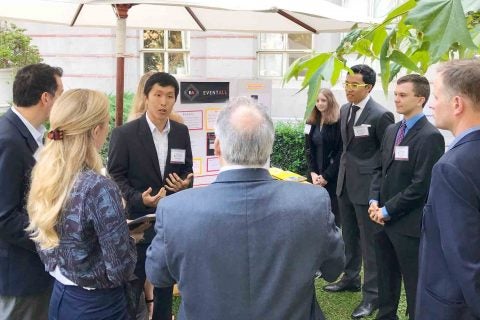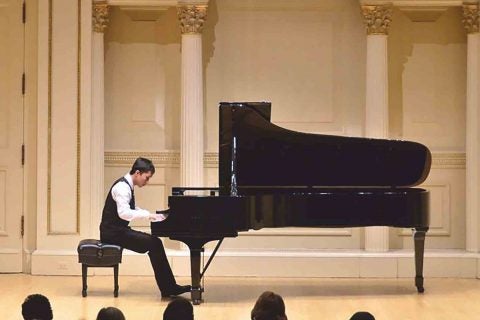
Music Industry senior Alvin Liang displays his EventAll app. (USC Photo/Dario Griffin)
The music industry has high hopes for a Trojan’s tech expertise
USC Thornton innovator plans prototype for a project that would help small club owners or large promotion companies — and the typical consumer, too
Alvin Liang has a few music industry insiders expecting big things from him. Not for his artistry, mind you, but for his killer apps.
“I’m a believer,” said Paul Young, chair of the Music Industry program at the USC Thornton School of Music. “Alvin will be an innovator. He’s going to affect our business.”
In October, Liang floored the judges at the 11th annual USC Stevens Student Innovator Showcase, landing his team the $10,000 grand prize for best business concept. His idea: a scalable, self-serve event-planning platform called EventAll.
“The WordPress of the event-planning world,” is how Liang describes it in his elevator pitch.

EventAll is a flexible, self-serve platform that lets customers flow their branded event content into a flexible template. It’s also a cloud-based event-hosting platform, which means organizers can connect early with their target audience and stay in touch long after the crowd goes home.
“Alvin has created something that democratizes the whole calendar and fan connection process — from the smallest club owner to the largest promotion company,” said Young, Liang’s faculty adviser and mentor, as well as former director of licensing and contracts at Universal Music Group, the world’s largest record label. “He’s finding a way to standardize something that had not been standardized.”
The $10,000 will help build out a functional prototype. Liang and his partners — all classmates from his “Feasibility Analysis” course at the USC Marshall School of Business — are currently building out the product and rapidly expanding their list of event organizers interested in beta-testing the platform. They expect to launch when Liang, who will be CEO, graduates in May.
From piano prodigy to tech success
The child of Taiwanese immigrants, Liang grew up in San Diego, where he dreamed of being a concert pianist. He played his first concerto at age 10 with the New City Sinfonia. At 17, he made his Carnegie Hall debut in a winners’ concert for the International Robert Schumann piano competition. But Liang’s own musical passion took an unexpected turn when he tried high school courses in digital composition and recording arts. From composing his own electronic music, he moved into producing soundtracks for student films, writing scores for indie videogames and forming his own record label.

A scholarship student, Liang came to USC — his first-choice school — to study in USC Thornton’s top-ranked Music Industry program. He soon found a second home at USC Marshall’s Lloyd Greif Center for Entrepreneurial Studies, where he pursued an entrepreneurship minor — that program is also ranked No. 1 nationally.
Liang arrived at USC already brimming with business ideas. Young vividly recalls their first meeting. It was at a USC Thornton freshman luncheon during Welcome Week. Having spent the summer mastering YouTube search-engine optimization, Liang sketched out some possible ways to monetize music videos for artists.
“I’ve never had a student come up to me and start a conversation with such an enterprising thought,” Young recalled. “I absolutely wanted to foster him from the moment I saw him. He was attacking a problem that I had begun thinking about much later in my career. And this was before he’d even taken a class!”
Fast friends
The two struck up a friendship. Liang has spent many hours with Young, himself a Grammy-nominated jazz trombonist and active studio musician, brainstorming on tech-based solutions to the music industry’s revenue drought. The problem in a nutshell: In a market where streaming has supplanted CDs, fans have come to expect access to artists and their creative output for little or no money.
If we can’t figure out a viable business model, this industry will struggle to survive.
Alvin Liang
“There’s so much technological change,” Liang said, in a tone that’s equal parts lament and impatient zeal. “Professor Young says we are the generation that has to solve this. If we can’t figure out a viable business model, this industry will struggle to survive.”
Internships with a major videogame maker, a fledgling 3-D audio startup and a growth hacking consulting company have reinforced Liang’s determination to rise to Young’s challenge: “How can we come out of this a better music industry? How can we solve these revenue issues? These questions are always in the back of my mind,” he said.
Which leads to Liang’s prize-winning app.
“I think EventAll is a really powerful solution to the monetization problem because many people think events are the future of the music business,” he said.
Liang envisions a sliding fee structure. A simple event app for a 200-guest wedding might cost just $50, while organizers of mega-events like Coachella could access the full range of EventAlls functionalities — for example, advance ticket sales or in-app food and beverage ordering to reduce concession lines.
On the user side, Liang plans to incorporate popular event-related features found on Goldstar, Facebook and Meetup to let attendees search for events by area, make wish lists, send event invitations to friends and meet new friends based on shared interests.
Up to the challenge?
Young is optimistic about Liang’s chances of success.
“He’s got the code developed for the backbone. He’s still got more work to do — that’s why it’s appropriate he won that innovation award. He’s still in development. But he has a very clear vision of where he’s going, and I haven’t been able to poke holes in it. And I honestly tried for his benefit.”
Whether Liang is up to the bigger challenge of fixing the music industry’s broken revenue pipeline remains to be seen. But Young is hopeful.
“Alvin represents the kind of student I want to see coming next,” he said. “He’s the model of something that has been fairly elusive — someone who can use modern tools and develop them creatively but understands the constantly changing nature of our industry.”
